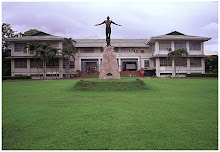
Today’s red hot rolling issue of House Bill 5043 , otherwise known as the Reproductive Health Bill has now been a major concern of each and everyone of us. It has entirely reached every corner of the street, each dining table of the family, and even the sacred altar of the church. Meanwhile, its main flux lies on the question, “Should the Catholic Church interfere in the undertaking of House Bill 5043?”
According to Rev. Fr. Juvy Leonardo, our parish priest in St. Polycarp Parish, “The Church indeed has the right to interfere in this Reproductive Health Bill issue. Its main concern is morality, and since this HB 5043 is a moral issue, then we have to meddle in this matter. Tulad ng korupsyon, ito rin ay isang usaping moral, hindi lang tungkol sa family planning kundi buhay-moral ng pamilya. What we are promoting is responsible parenthood, the moral responsibility of the parents and the protection of human life itself. Dahil sa pagtutol nami dito(HB 5043), sinasabi nila na traditional daw ang Simbahan. Pero hindi naman ganito ang Simbahan, ang tanging hangad namin ay pangalagaan ang buhay ng bawat isa. The defense of life has to start from the very inception of life itself, which is the time of fertilization and not implantation (as what HB 5043 promotes). Because of this critical difference, we may define contraceptive methods as abortifacients in reality. How could you protect life if you are promoting the culture of death? Kailangang tignan sa moral aspect ang real value nito, nakikialam kami kapag moral na ang pinaguusapan.”
Here, we may visibly situate the Catholic Church in the
A just society is the core criterion of politics. As an authority of accountable leaders, its goals are profoundly attached to justice, in which its nature has something to do with ethics. But the seeming problem is on practical reason; the proper exercise of power in accordance to morality. For me, our politicians are marred in to an ethical blindness of the overwhelming and glaring effects of power and self-interest. Eventually, the Church responds to this by liberating politics from its blind spots. This is where Catholic social doctrine finds its place; it has neither intended of giving the Church power over the State nor dictated the views and conducts of our political leaders. Its aim is merely to aid in purifying political reason and more importantly, to contribute to the acquisition of what is just for the common good.
Therefore, I have not come here to defend my Catholic faith or to deeply secure its location in the political arena. Rather I withstand here to evidently present the Catholic Church’s ever-significant role in changing our country’s political system. At this juncture rest the Church’s indirect duty of purification of reason and the revival of the morality of the nation. And this is the so-called ecclesial responsibility of the Church, a counterpart of social responsibility which definitely translates that “politic transubstantiation”.
BUENO, Christian Benedict T.
POSC1-X

